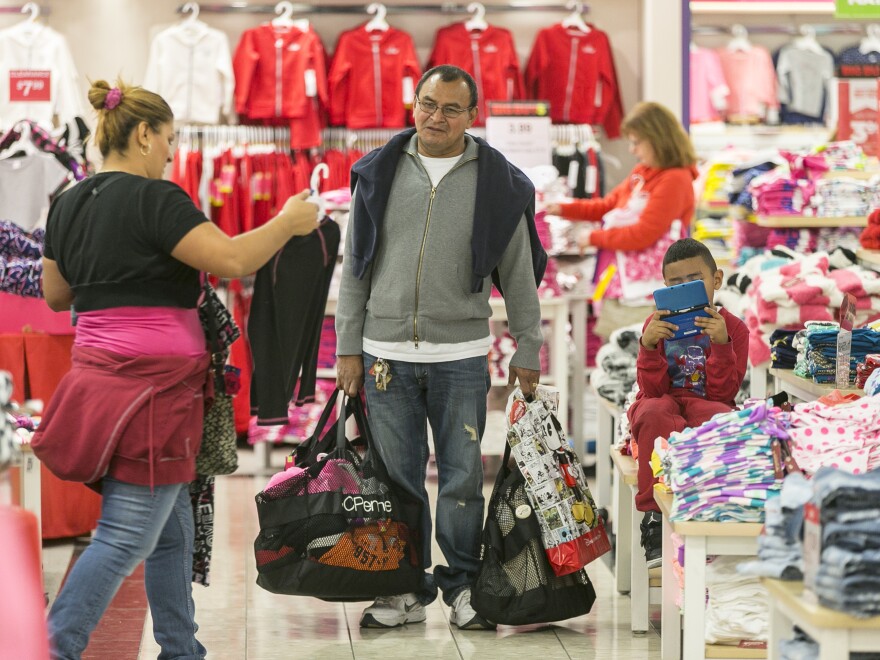Escalating tariffs, a global trade war and a volatile stock market have many people on edge. Senior Economics Editor Tom Hudson looks at the economic uncertainty and the stock market volatility of companies in South Florida.
Worries among Floridians about the economy and paychecks have been building for weeks, even before President Donald Trump announced global tariffs a week ago. On Thursday, he reversed course — for now. He announced a pause on the reciprocal tariffs, except for the fees on goods from China.
How will these tariffs affect Floridians if they are instituted?
There are two primary ways they will affect Florida: consumer prices and imports.
A tariff is a tax on something that is imported. It raises the cost of that item.
Last weekend, I bought a new pair of shoes. They were on sale for $100. They were made in Vietnam. It was stamped right there on the inside of the tongue of the shoes. Under Trump's tariffs, it would cost 46% more to import those shoes from Vietnam to Miami. Odds are some of that tax would wind up in the retail price I paid.
The job market is fairly strong. Inflation has been falling but consumers also have been getting more anxious.
That's how tariffs may affect consumer prices.
Another impact may be on the business of importing. There are 16 seaports in Florida. The bigger ones are on the Atlantic Coast. PortMiami and Port Everglades are in South Florida and Jaxport is in Jacksonville.
Higher tariffs will mean more expensive imported products, which may cool demand and lead to a drop in imports. That would affect business on and through the ports. One source in real estate shared with me that there's new worries about how the value of warehouses could be hurt by a drop in imports.
What Florida industries may feel the tariffs most?
Real estate is one, especially construction. The cost of Italian tiles for a bathroom renovation could go up. Imported wood from Canada and drywall from Mexico could become more expensive. If the prices of these go up, the prices of new homes may be pushed up.
Tourism may also see an impact. If people don't have as much money or are worried about their jobs, they may curtail their travels to Florida or shorten their visits leading to less spending at hotels, restaurants and other hospitality businesses.
And with consumer spending under pressure, retail jobs would be under pressure, too.
READ MORE: 'Pain in the butt': How a big Florida furniture importer tackles Trump's new tariffs
How have the stocks of Florida companies performed during all the ups and downs of the stock market?
It has been a rollercoaster. And not for the faint of heart.
Among the biggest losers in the days after the tariffs were first announcement was NextEra Energy, the parent company of the largest electricity company in the state — FPL. Utilities like electric companies usually are seen as a port in the storm of a stock market selloff because people will still be using electricity.
For-profit prison operator GEO Group based in Boca Raton also fell in the sell-off, but rebounded Thursday after Trump announced he was pausing most tariffs. GEO Group stock had experienced a big rally in the weeks after the president's election in November.
On Thursday, the stock of air conditioning maker Carrier regained much of what it lost in days after the tariff announcement. It makes AC units in the U.S., Mexico and other places.
Cruise ship operators Carnival, Norwegian and Royal Caribbean saw big waves of selling, then a big wave of buying.
The worries here are that consumer spending will be sapped by the new tariffs… and without the tariffs people will crowd onto cruise ships.
What kind of shape is the Florida economy in?
It's pretty good. The job market is fairly strong. Inflation has been falling but consumers also have been getting more anxious.
Miami-Dade had the lowest unemployment rate in the state in February at 2.6% — a very low number. The South Florida jobless rate was 3.2%. That is lower than the state and national rates.
How worried are consumers?
The University of Florida surveys Florida consumers every month. It's called consumer sentiment and it fell sharply in February and March by more than it fell in the first month of the COVID-19 pandemic. And it fell across age groups and across income groups.
Floridians are getting more pessimistic about their financial conditions over the next year and the next five years.
That can hurt consumer spending, which is a key driver of the Florida economy.
Consumers are more worried but the job market is strong. How about wages and inflation?
Average hourly wages across the state were up about 6% in February compared to a year earlier. That's not adjusted for seasonal variations, but it's a strong number.
Inflation in Miami rose 2.9% last month. That's up from last summer. So there are signs price trends are picking up again along with wages.
What could tariffs mean for inflation?
Tariffs are a price shock if they're passed through all at once. Inflation is the sustained increase in general price levels.
Regardless if tariffs are a one-time price increase or are phased in and raise inflation, it results in higher prices, like that pair of shoes made in Vietnam I bought in Miami a few days ago.
Copyright 2025 WLRN Public Media


